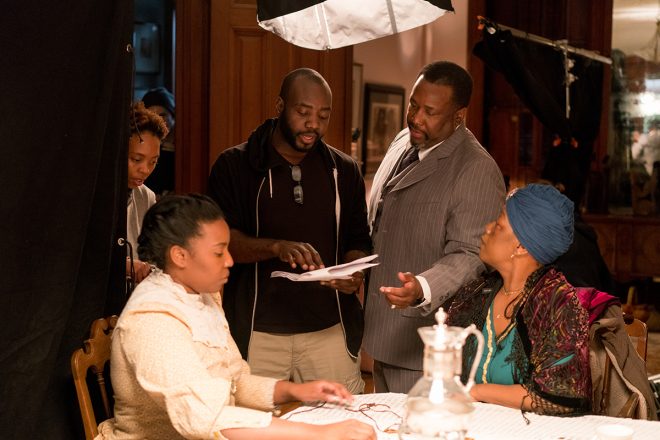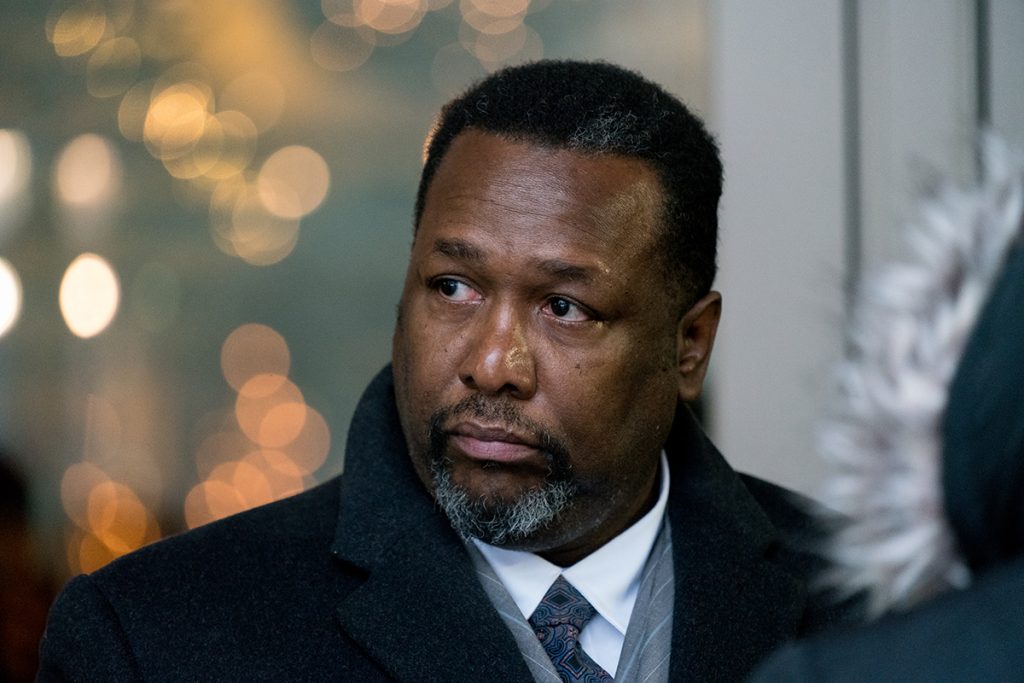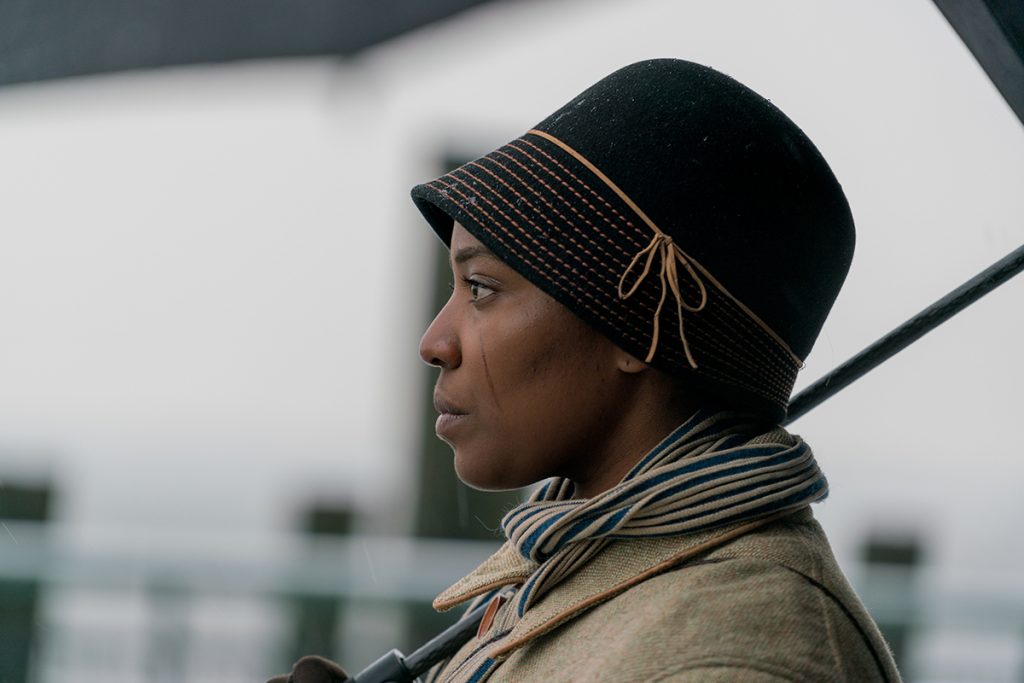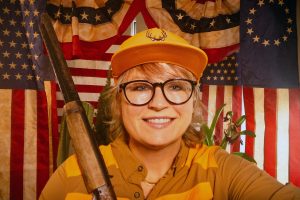Q & A with Alrick Brown, Director of “The Forever Tree”

INTERVIEW / ALEXANDER JEFFERY
PHOTOS / JOEL PLUMMER
The Forever Tree, a short film that premiered at the Bentonville Film Festival, is a groundbreaking African-American adventure film that stars Wendell Pierce (“The Wire”) and Olivia Washington (“Lee Daniels’ The Butler”), a noted rising star in television and film.
Written by Chrishaunda Lee Perez, Marc Novak and Fayetteville resident Stephen Hintz, the dramatic short story takes place in 1919, with a wide cast of historical characters such as the hair and beauty American icon Madame C.J. Walker, and other notable black leaders of the era. The short film production serves as a first act to a feature-length film of the same name, which encapsulates a remarkable and intriguing journey throughout America, Jamaica, and Ghana, and examines the universal struggle of power and familial love.
The film is helmed by Alrick Brown, an award-winning director and Filmmaker Magazine’s new “25 Faces to Watch.” Along with directing, Brown also teaches filmmaking at New York University. We asked one of Arkansas’ hot young directors, Alexander Jeffery, a two-time winner of the Louisiana Film Prize, to talk shop with Brown. Here’s what happened.
How did you become involved in the film?
I got a call. From Stephen Hintz, one of the producers, and [he] said: “Hey, I read about you. You lived in Africa, you’re from Jamaica, you lived in Harlem, you kinda have all of the pieces of our story, would you be interested in directing this?” And I was like… ‘uh, well, you know, I’ve kinda got a busy schedule, but why don’t you send me the script?’ And he told me it was a piece of a feature that they were trying to put together and, um, they just wanted to do a… kind’ve a prelude. And I read what they wrote, and you know people send me stuff all the time, but rarely is it well-written and does it feel like there’s something there, and I read it and was like, ‘no no there’s actually something here’… you know? So I asked, when are you guys shooting? He’s like, well, three weeks. [Laughter.] Okay… well what do you have? They have a location. So, everything we have to do is in that location… that they’ve already established. And I was like, can I see this place? [Laughter.] So really it was like that. But after I read it, I was like… screw it, let’s do it, you know? I knew it was gonna be a two-day shoot on the weekend and I was gonna be free that weekend. So we made it work.
That must be weird to come in and have so many things already in place. How were you able to bring your own unique perspective and voice to the project?
Well, that’s the one thing… I did ask them, I said, you know, the script… even though the elements were there, I did say to them, there’s a few things that could make this a more complete story. Even though it’s the introduction to a bigger story, it still was not as complete [as it could be.] I tried to push and pull to see where I could make a couple of adjustments. And I told them all of the adjustments and why I was making them. And so they let me make a few adjustments to the story. When they were cool with that, I saw that they were willing… so even though I was given a date and a time, the process was collaborative. And one of the things I did say to Steven, I said, ‘Listen, if you hire me, you get all of me.’ [Laughter.] I have to kind’ve creatively make this work. And, so, they trusted me on that level. I was able to put a little bit of a stamp… I brought in my DP, my editor, I found production designers, you know, found a few people who I knew could make this thing work. It was an independent film on the highest level.
Was there a sense of closeness on set?
Yeah, absolutely. So, without the DP and I being so close, there’s no way to pull it off in two days. He and I had worked together on so many occasions, so that was easy, you know, or pragmatic, or practical. And then, you know, having my students, who I’ve taught film but they’ve never seen me work, for them just being on a real set and watching it unfold, I’m sure there was definitely a level of closeness and camaraderie that was built up, and also respect, mutually. With indie [film], when the money’s small and the time is limited, there has to be a lot of love. And, I mean, that’s kind’ve how I run my set anyway… It’s just a movie, so you’ve gotta enjoy the process.

What is your process as a director? What sort of things do you do in preparation, or even on the day, to create that sense of being in the world?
Well, because we didn’t have rehearsals, and because the actors were mine from different places… we shot Saturday and Sunday. I scheduled a dinner for Friday night. So we got to have dinner together. And for me, sometimes it’s not just about the script, it’s just about knowing people. And people got a chance to talk to each other. And I asked all of my actors, I asked the characters who were supposed to be the closest to exchange a secret. Something I don’t want to know, but between each other. So they got a chance to talk, and they literally exchanged secrets, like when they lost their virginity, so in exchanging that secret when they get on set at least they have a history, they have a background. And maybe it feels like in the takes that there’s some history there. There’s some connection. Even if the characters are in conflict, there’s still some history that we don’t understand yet, but we might want to know more about that history. So, that’s one specific thing. The other thing was… to talk to them about what they saw. And to kind’ve cloud their fears. I know for Olivia, who played Tawny, she had a lot of words to say, and she was concerned about the wordiness. And I was like, don’t worry Olivia, it’s Tawny, it’s not you, Tawny knows a lot about a lot of stuff. So, take those words, and even if you don’t know all the meanings behind them, she knows it. [Laughter.] Just having those conversations, so without rehearsing, everyone knew their why. They knew their objectives, they knew their relationships, so that by the time we said action, you know, it could manifest there. And when you don’t have much time, those are the things that help. Just the basics, let people know why they’re there and what they’re doing.
What was your favorite scene to shoot or favorite moment on set?
My favorite was the ending.
Where they’re waiting for the boat?
Yeah. Because…. I wanted to get out of the interior location. [Laughter.] And that was written into the script, was her getting on this ship. And it was like… finding a place in New York City. And it just happened to be one of the worst storms that we had, and when I saw the weather report leading up to that weekend, it was gonna snow. I was like, perfect.
It looked gorgeous.
I was like, perfect. You couldn’t ask for anything better. But that was how we started our film, that was the first thing we shot. We had the whole rest of the day to shoot. So, how do you pull a shot like that off? And I told my team… one shot. That’s it. We have to go up there and get one shot. And when you’re doing films like that, you know, you’re tempted to try to capture more, do more coverage, but this is about getting one shot, otherwise the day is just gonna prolong. And we were there, and we did one angle, one shot, did several takes, and we got the take we needed, we were good. We ended up, as everybody was walking away and packing up, I said, you know let’s just do a second shot to get a wide. And that’s how we got the wide, but it was really about that one shot. And that’s that filmmaking, problem-solving, using your limitations to your benefit, so that was pretty fun.

How has being a teacher affected you as a filmmaker?
Not to toot my own horn, but because I have some of the most amazing filmmakers as students, they’re constantly pushing and challenging, and so I have to be as sharp as them. And teaching and directing have a lot in common. It’s less about me conveying information to them, and more about creating an environment where information can be transmitted. And you can be vulnerable, you can fail, you can succeed, and it’s okay. So, what I do in the classroom gets translated to the set, and what I do on set gets translated to the classroom, so teaching does make me a better filmmaker. Because I learn from them and I’m forced to be on top of my game because of them.
What do you hope people in Bentonville take away from the film?
I just hope they enjoy the ride, and… I hope they wanna see more. I mean, the whole purpose of this piece was, like, hopefully they wanna see more. Hopefully they get engaged enough that they wanna see… the rest of this and see this story unfold. And care. Care enough about Tawny enough to be engaged.
Thanks so much for taking the time.
It was a pleasure.





Comments